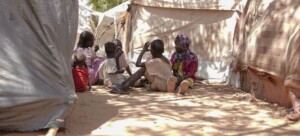Toxic waste found near Sudan residential area
The Sudan Ministry of Health has confirmed that a container of illegally dumped hazardous radioactive medical waste has been found near to a residential area west of Omdurman, Sudan’s second city, north-west of Khartoum on the western bank of the Nile.
 Chlorine storage cylinders outside a chemical plant in Burri, Khartoum (file photos RD)
Chlorine storage cylinders outside a chemical plant in Burri, Khartoum (file photos RD)
The Sudan Ministry of Health has confirmed that a container of illegally dumped hazardous radioactive medical waste has been found near to a residential area west of Omdurman, Sudan’s second city, north-west of Khartoum on the western bank of the Nile.
The Ministry suspects that the container could be part of illegal dumping that is known to have occurred during the building of the Merowe Dam in 2013. The ministry also confirmed that they initiated an investigation into the incident to find out who is responsible.
The director of the Preventive Medicine Department Mohamed Abdelrahman said that his department carried out a field visit to the area, where they discovered illegal dumping of containers of medical waste.
He confirmed that they have formed a committee to investigate the illegal dumping in question. He explained that the authorised dumping ground belongs to the Supreme Council for the Environment. “The dumping ground is close civilian residence and herders,” he said.
In November 12, 2015, Radio Dabanga reported that China was suspected to have buried dozens of containers with toxic waste in the desert of northern Sudan, according to a high-ranking official. The waste was most probably from nuclear plants in China. According to the former director of the Sudan Atomic Energy Commission in Sudan, Mohamed Siddig, 60 containers were brought to Sudan together with construction materials and machinery for the building of the Merowe Dam.
The Merowe Dam, known by locals as Hamdab Dam, located near the Nile’s fourth cataract, was completed in 2009 by Chinese, French, and German companies, and largely funded by China and Arab financiers. The project doubled Sudan’s electricity generating capacity, but displaced more than 50,000 people from the Nile Valley to arid desert locations.
Siddig said at the time that 40 containers were buried in the desert not far from the Merowe Dam construction site. Another 20 containers were also disposed in the desert, though not buried.
Radio Dabanga’s editorial independence means that we can continue to provide factual updates about political developments to Sudanese and international actors, educate people about how to avoid outbreaks of infectious diseases, and provide a window to the world for those in all corners of Sudan. Support Radio Dabanga for as little as €2.50, the equivalent of a cup of coffee.












 and then
and then